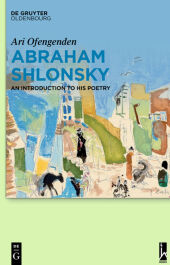 Neuerscheinungen 2014Stand: 2020-02-01 |
Schnellsuche
ISBN/Stichwort/Autor
|
Herderstraße 10
10625 Berlin
Tel.: 030 315 714 16
Fax 030 315 714 14
info@buchspektrum.de |

Ari Ofengenden
Abraham Shlonsky
An Introduction to His Poetry
2014. X, 224 S. 230 mm
Verlag/Jahr: DE GRUYTER; DE GRUYTER OLDENBOURG 2014
ISBN: 3-11-035061-0 (3110350610)
Neue ISBN: 978-3-11-035061-6 (9783110350616)
Preis und Lieferzeit: Bitte klicken
[The] perception of Shlonsky as the expression of chaos and anarchy of the modern world, of nothingness and lack in contrast to the customary image of his Poetry as constructive and positive, here is a challenging and new conception which demands of us that we will read this poetry anew. The book and the interpretation offered by it will definitely effect both every future reading of his poetry and his place and stature in the modern Hebrew canon. (Dan Laor)
The poet Abraham Shlonsky (1900-1973) can be regarded as the main architect of Jewish Modernism and Hebrew secular culture. In his crucial contribution, Ari Ofengenden disentangles Shlonsky´s work from Zionist readings and shows how his poetics redeem experiences of radical political displacement, exile and alienation through the use of a precise, chiseled yet playfully enigmatic style. Writing on immigrants, refugees and urban outcasts following the traumatic events of the First World War and the Civil War in Russia, his poetry constitutes a fusion of Modernist European poetry with biblical and rabbinic sources with the influences of Georg Trakl and Rimbaud. The book situates Shlonsky´s poetry in the context of his "rebellion" against the romantic poetry of C.N. Bialik and as an active participant in the European styles of Symbolism and Expressionism. The book is indispensable for understanding Modern Hebrew and Jewish culture, and more generally as an exemplar of today´s more prevalent hybridizations of tradition and modernity.
"[The] perception of Shlonsky as the expression of chaos and anarchy of the modern world, of nothingness and lack in contrast to the customary image of his Poetry as constructive and positive, here is a challenging and new conception which demands of us that we will read this poetry anew. The book and the interpretation offered by it will definitely effect both every future reading of his poetry and his place and stature in the modern Hebrew canon." (Dan Laor)
Ari Ofengenden, George Washington University, USA.


